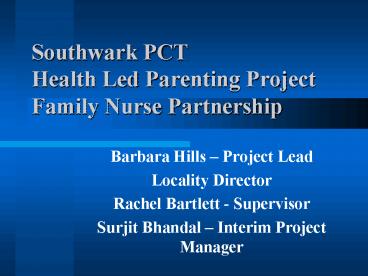Southwark PCT Health Led Parenting Project Family Nurse Partnership - PowerPoint PPT Presentation
1 / 14
Title:
Southwark PCT Health Led Parenting Project Family Nurse Partnership
Description:
Based on Nurse Family Partnership which has been rigorously tested in USA over ... the principle of progressive universalism' into maternal services should be ... – PowerPoint PPT presentation
Number of Views:300
Avg rating:3.0/5.0
Title: Southwark PCT Health Led Parenting Project Family Nurse Partnership
1
Southwark PCT Health Led Parenting
ProjectFamily Nurse Partnership
- Barbara Hills Project Lead
- Locality Director
- Rachel Bartlett - Supervisor
- Surjit Bhandal Interim Project Manager
2
Family Nurse Partnership (UK programme)
- Based on Nurse Family Partnership which has been
rigorously tested in USA over 30 year period. - 10 pilot sites in UK. London has 2 Tower
Hamlets and Southwark. - Supports families/young pregnant women who have a
low income. - First time parents
- Supported through pregnancy and first 2 years of
life.
3
Social Exclusion Action Plan Reaching Out
- We have seen reductions in child poverty,
unemployment and crime, we now need to help those
families caught in a cycle of disadvantage and
exclusion by - Earlier and better identification of at risk
families - Earlier and more effective intervention and
prevention - Building on the strengths of existing universal
health visiting and midwifery services - Builds on policy successes for children and
families (Every Child Matters and the National
Service Framework for maternity and children) - Multi-faceted risks need multi-faceted but
integrated responses
4
Like it or not, the most important mental and
behavioural patterns, once established, are
difficult to change once children enter
schoolNobel Laureate James Heckman (2005)
- Pregnancy and the first 3 years are vital to
child development, life chances and future
achievement - Pregnancy and birth of a child is a magic
moment of opportunity when parents are uniquely
receptive to support - Universal midwifery and health visiting services
are ideally placed to identify children and
families at risk - Embedding the principle of progressive
universalism into maternal services should be a
priority to ensure that additional support is
provided to those children and families at
greatest risk
5
Emerging knowledge on neurological development
- Brain development depends on both genes and
experiences - Rapid brain development takes place in the first
year of life - Early interactions directly affect the way the
brain is wired use it or lose it - Early relationships set the thermostat for later
control of stress response - (Shore R, Rethinking the Brain, 1997)
6
Why love matters
- Looks and smiles help the brain to grow
- Baby looks at mother sees dilated pupils
(evidence that sympathetic nervous system aroused
and happy) own nervous system is aroused - heart
rate increases - Lead to a biochemical response - pleasure
neuropeptides (betaendorphin and dopamine)
released into brain and helps neurons grow - Negative looks trigger a different biochemical
response (cortisol) stops these hormones and
related growth -
(Gerhardt, 2004)
7
Differences in brain development following
sensory neglect
8
Family Nurse Partnership Visiting Schedule
- Once every week for first month
- Every other week through Pregnancy
- Once every week for first 6 weeks after delivery
- Every other week until 21 months
- Once a month until child is 2 years old
9
Southwark PCTs Programme Scope
- Aim to recruit 120 families - Equates to 24
families per home/health visitor - CRITERIA
- All first time mothers under 20 years Between 16
28 weeks of their pregnancy - No marketable education qualification
- Lack of meaningful social support
- May have other major issues, ie, mental health
illness
10
Whats different?
- Programme outcomes are dependent on faithful
replication of the original research - Fidelity to the research model - responsibility
of Supervisor - Content prescribed but delivery tailored
- network for publicity
- Client centred, strength based and solution
focused
11
Content of visits covers 6 domains
- Personal health womens health practices and
mental health - Environmental health adequacy of home and
neighbourhood - Life course development womens future goals
- Maternal role skills and knowledge to promote
health and development of their child - Family and friends helping to deal with
relationship issues and enhance social support - Health and human services linking to other
services
- other services
12
FAQs
- Can anyone refer to the team? YES
- How long will this service be available? THE
PROGRAMME IS RECRUITING UNTIL SEPTEMBER 2007
(TARGET OF 120 FAMILIES) - What is the skill mix of the team? THEY ARE ALL
EXPERIENCED HEALTH VISITORS (SOME ARE DUAL
TRAINED) HAVE RECEIVED ADDITIONAL TRAINING TO
DELIVER THIS SERVICE - What is the difference between the Family Nurse
Partnership (FNP) and Sure Start Plus? THE FNP
IS A PRESCRIPTIVE PROGRAMME WHICH ALL 10 SITES
HAVE TO IMPLEMENT IN AN IDENTICAL WAY
13
- There is no one model of Sure Start Plus. The
implementation of Sure Start Plus has been left
to local implementation and has become integrated
/linked to the Teenage Pregnancy Strategy. - Therefore it was difficult to evaluate and
measure some of the objectives due to poor data
recording/collection. (Example, repeat
pregnancies, health targets no significant
differences on the breastfeeding and smoking
cessation) - The Sure Start Plus National Evaluation
highlights the need to develop health services
specifically targeted at meeting young peoples
needs. Through partnership work, the teenage
pregnancy/parenthood support service should take
a lead within the Childrens Trust to influence
mainstream services, such as maternity, health
visiting and housing services.
14
Family Nurse Partnership Team in Southwark
- Supervisor Rachel Bartlett ext
7836 - FNP Team Bernie Chambers ext 7839
- Ann Cleary ext 7837
- Margaret Wilkins ext 7838
- Margaret Khumalo
- Dorothy Oseki
- Base Gaumont House
- (Peckham Camberwell Locality Offices),
- 95 Marmont Road,off Peckham High StreetPeckham,
London, SE15 5SL - Tel 020 7138 7840 Fax 020 7639 9290






























